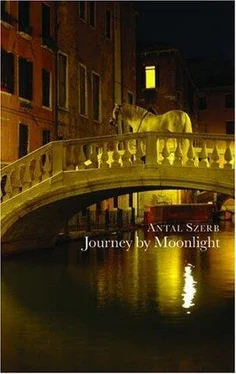Go thou to Rome — at once the Paradise
The Grave, the City, and the Wilderness.
SHELLEY: Adonais
MIHÁLY had now been in Rome for several days, and still nothing had happened to him. No romantic leaflet had fallen out of the sky to direct him, as he had secretly expected after what Ervin had said. All that had happened was Rome itself, so to speak.
Compared with Rome, every other Italian city was simply dwarfed. Venice, where he had been with Erzsi, officially, and Siena, where he went unofficially with Millicent, paled in comparison. For here he was, in Rome alone, and, as he felt, on higher instructions. Everything he saw in Rome seemed to symbolise fatality. The feeling that, in the course of a morning stroll, or late one special summer afternoon, everything would suddenly be filled with a rare and inexpressible significance, was one that he had known before. Now it never left him. He had known streets and houses to stir in him far-reaching presentiments but never with the force of these Roman streets, palaces, ruins, gardens. Wandering among the vast walls of the Teatro Marcello, gazing into the Forum with wonder at the way little baroque churches had sprung up between the ancient columns, looking down from some hill at the star-shape of the Regina Coeli prison, loitering in the alleyways of the ghetto, passing through the different courtyards from Santa Maria sopra Minerva to the Pantheon, with its great millwheel of a roof open to the dark blue summer sky: these filled his days. And in the evening weary, weary to death, he would fall into bed in the ugly little stone-floored hotel room near the station, where he had scuttled in terror on the first evening, and then lacked the energy to change it for something more suitable.
From this general trance he was awakened by a letter from Tivadar, which Ellesley had forwarded from Foligno.
Dear Misi,
We were all very concerned to read that you’ve been ill. With your usual vagueness you forgot to mention what precisely is wrong with you, and you can imagine how anxious we are to know. Please remedy this in due course. Are you now fully recovered? Your mother is extremely worried. Don’t take it amiss that I’ve not sent you any money before this, but you well know the difficulties with foreign exchange. I hope the delay hasn’t caused you any problems. Now, you wrote, send a lot of money. This was a bit vague—‘a lot of money’ is always relative. You may find what I have sent rather little, since it’s not much more than the amount you say you owe. But for us it is a lot of money, considering the state the business is in just now, about which the less said the better, and the major investments we made recently, which will take years to amortise. But at least it will be enough for you to pay off your hotel bills and come home. Luckily you had a return ticket. Because it hardly needs saying, you really have no alternative. You can understand that in the current circumstances the firm really won’t stand the strain of continuing to finance one of its partners residing expensively abroad, quite without rhyme or reason.
Even less so, since, as you would expect, as a result of the situation she finds herself in, your wife has herself approached us with certain demands, quite properly in our view, and these demands we naturally must satisfy as a highest priority. Your wife is at present in Paris, and for the time being has stipulated that we should meet her living expenses there. The final settlement can only be drawn up when she comes home. I really can’t overstate what an exceptionally difficult position that final settlement could put us in. As you well know, all the ready money she brought into the firm was invested in machinery, the prestige building, and other current developments, so that liquidating all these sums will not only cause us difficulties, but will practically shake the firm to its foundations. I really do think anybody else would have taken all this into account before abandoning his wife on their honeymoon. I need hardly add that, quite apart from all the financial considerations, your conduct was in itself absolutely and utterly ungentlemanly, particularly towards such a correct and blameless lady as your wife.
Well, that’s the situation. Your father was not entirely persuaded that I should write to you at all. You can imagine how nervous and distressed these events have made him, and how alarming he finds the prospect that sooner or later we shall have to pay everything back to your wife. He’s taken it all so much to heart that we want to send him on a holiday for a break (we’re thinking mainly of Gastein), but he won’t hear of it because of the extra expense of travelling during the summer holiday season.
So, dear Misi, on receipt of this letter be so good as to pack up and come straight home, the sooner the better .
Love from everyone,
Tivadar
Tivadar had certainly enjoyed writing that letter, revelling in the fact that he, the feckless playboy of the family, was now in a position to preach morality to the sober and serious Mihály. This in itself, and the superior tone of voice from a totally unsympathetic younger brother, made him very angry. Now, returning home could be seen as nothing more than an imposition, a horrid and hateful command.
But, it seemed, there really was no alternative. If he paid back the loan from Millicent there would be nothing left for him to live on in Rome. What also disturbed him deeply was what Tivadar had said about his father. He knew that Tivadar was not exaggerating. His father had a tendency to depression, and the whole disaster, in which material, social and emotional problems were linked together in such a complicated way, was just the sort of thing to destroy his peace of mind. If the other elements failed to achieve this, it was enough in itself that his favourite son had behaved so impossibly. He really would have to go home, if only to make amends for this, to explain to his father that he simply could not have done other than he did, not even for Erzsi’s good. He needed to show that he was not a runaway, that he took full responsibility for his action, as a gentleman should.
And once home he would have to knuckle down to work. Now everything would be work. Work was the promised reward for a young man setting out, for completing his studies, and work was the penitential act and punishment for those who met with failure. If he went home and worked steadily, sooner or later his father would forgive him.
But when he thought in detail about this ‘work’—his desk, the people he had to deal with, and above all the things that filled his time after work, the bridge parties, the Danube outings, the well-to-do ladies, he felt exasperated to the point of tears.
“What did the shade of Achilles say?” he pondered. “‘I would rather be a cotter in my father’s house than a prince among the dead.’ For me it’s the reverse. I’d rather be a cotter here, among the dead, than a prince at home, in my father’s house. Only, I’d need to know what exactly a cotter is … ”
Here, among the dead … for at that moment he was walking in the little Protestant cemetery behind the pyramid of Cestius, beside the city wall. Here lay his fellows, dead men from the North, drawn here by nameless nostalgias, and here overtaken by death. This fine cemetery, with its shady wall, had always lured souls from the North with the illusion that here oblivion would be sweeter. At the end of one of Goethe’s Roman elegies there stands, as a memento: Die Pyramide vorbei, leise zum Orcus hinab . “From the tomb of Cestius, the way leads gently down to Hell.” Shelley, in a wonderful letter, wrote that he would like to lie here in death, and so he does, or at least his heart is there, beneath the inscription: Cor cordium .
Читать дальше












